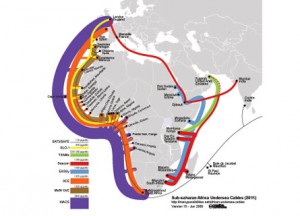 Mobile growth has shaped the past ten years, but broadband will shape the next ten years. An ITU Human Capacity Development Forum for Africa held in Kampala on July 8-10, 2009 addressed Africa’s readiness for broadband.
Mobile growth has shaped the past ten years, but broadband will shape the next ten years. An ITU Human Capacity Development Forum for Africa held in Kampala on July 8-10, 2009 addressed Africa’s readiness for broadband.
Clive Shepherd, an expert in human resource development, says the ICT sector in Africa is in a unique position. “The biggest obstacle,” he says, “is no longer technology, but the willingness to take advantage of new opportunities and technologies. And it’s a very exciting position to be in.”
In order to make information and communication technology (ICT) and telecom services more efficient and affordable for all African citizens it is necessary to improve policy and regulations on liberalisation and intellectual property, increase competition to drive down prices and increase telecom penetration, create a digital content industry, exploit all assets at the companies disposal, specifically human resources, and create a digital content industry.
1. Currently, however, most ICT providers don’t have coherent training plans says Goodluck Ole-Medeye, Director of Corporate Resource Management at the Tanzania Communications Regulatory Authority. Most companies, he says, incorrectly consider training a cost instead of an investment.
Shepherd explains that the increased pace at which it is required to deliver learning and development programs, creates new pressures. To combat this, companies need to make learning more accessible by taking advantage of new thinking, new expectations and new tools. Companies should choose learning methods and media that maximize the effectiveness of learning.
But developing human resources is not enough, according to Dorothy Gordon, Director-General of the Ghana-India Kofi Annan Centre of Excellent in ICT.
“In Africa, 95% of internet traffic is externally oriented,” she says, “It works out to be almost 20,000 times more expensive for an African to access the Internet. Unless we solve this, it’s going to be difficult to develop a digital content industry.”
Gordon emphasizes that if you are going to have innovative IT, you have to have people who understand design, who understand communications, in the sense of being able to communicate a message and not simply using the technology. It is this last mile element that is lacking from our training institutions throughout the continent.
1. “We put emphasis on technology and forget the other aspects which make it possible for the population to use technology,” Gordon says. “If Africa is going to progress, we have to be able to share knowledge, build on knowledge, and do it freely. That is a quality of the digital content industry.”
The skill sets required for human capacity are not being adequately addressed. Software development, content authoring and management require technical enablers, content developers and a management and distribution chain that are founded on such skills as literacy, knowledge of the subject matter and basic HTML and database skills.
1. According to Gordon, the institutions in Africa that train people involved in content authoring, are not addressing the IT dimension of the skill set.
2. “There are many people selling e-learning platforms but right now very few have the skill set necessary to be able to exploit the platforms adequately. Meanwhile, she says, that money is going away from the educational budget and is instead being invested in IT. “What are the returns without the adequate preparations?” she asks. “There is a combination of skill sets required in order to get adequate returns.”
Africa, Gordon argues, is not yet prepared for a digital content industry. Even countries in Asia have specific strategies for developing their digital content industry as a means to fuel local demand in e-learning, e-health and e-government.
1. “In Africa, if you look at IT policy documents and strategies a whole lot of attention has not been paid to this. We have seen flashes of creativity. The flashes of creativity don’t mean that we have any depth to the industry,” Gordon says.
In her presentation at the ITU Forum, Gordon called for an instructional redesign that includes a redefinition of degrees, a redefinition of courses, and the creation of formal tertiary training.
Each organization, company, government and institution needs to think about how to build your industry so that the content riding on the broadband not only serves the needs of urban elites but will actually serve a better and more integrated society which includes all Africans.
